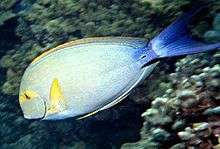Yellowfin surgeonfish
The yellowfin surgeonfish or Cuvier's surgeonfish (Acanthurus xanthopterus) is one of several marine fish that change color as they get older. This characteristic confused fish identification, and originally put the young and adults in different species. With the arrival of aquaria and later, coral reef aquaculture, specialists noticed the color transformation. Only recently have zoologists begun to understand their metamorphosis.
| Yellowfin surgeonfish | |
|---|---|
 | |
| Scientific classification | |
| Kingdom: | Animalia |
| Phylum: | Chordata |
| Class: | Actinopterygii |
| Order: | Perciformes |
| Family: | Acanthuridae |
| Genus: | Acanthurus |
| Species: | A. xanthopterus |
| Binomial name | |
| Acanthurus xanthopterus Valenciennes, 1835 | |
Description
The yellowfin surgeonfish ranges in length to 70 cm (28 in). It has eight or 9 dorsal spines, 25-27 dorsal soft rays, three anal spines, 23-25 anal soft rays, and 16-24 anterior and 17-22 posterior gill rakers.[1]
Its body is purplish gray. It has a region of dull yellow in front of its eye. The outer third of its pectoral fin is yellow, the extreme distal part is hyaline. Its dorsal and anal fins are yellowish grey basally and dull yellow distally. Its caudal fin is purplish and the caudal spine is small.[1]
Range and habitat
It lives near coral reefs at depths ranging from 5–90 m (16–295 ft). Its preferred temperatures are 24–28 °C (75–82 °F) at latitudes of 30°N to 30°S. It ranges from East Africa to the Hawaiian Islands and French Polynesia, north to southern Japan, south to the Great Barrier Reef, and New Caledonia, and in the Eastern Pacific, from the lower Gulf of California and Clipperton Island to Panama and the Galapagos Islands.[1]
Juveniles inhabit shallow, protected, turbid inshore waters, while adults prefer deeper areas of protected bays and lagoons.
Feeding
It feeds on diatoms, detritus film of sand, filamentous algae, hydroids, and pieces of fish. It is probably the only surgeonfish that readily takes bait.[1]
References
- Froese, Rainer and Pauly, Daniel, eds. (2007). "Acanthurus xanthopterus" in FishBase. October 2007 version.
